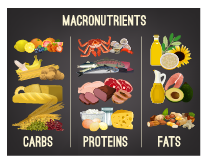
Gains for Strength Macronutrients
When it comes to strength gains, nutrition plays a vital role in supporting muscle development and recovery. In order to optimize your strengthfortraining routine, it’s vital to understand the role of macronutrients in providing the necessary fuel and building blocks muscle development.
1. Protein
is often referred to as the buildingProteinblock of muscles, and for good reason. It is essential for repairing and rebuilding muscle tissues that are damaged during intense strength training sessions. Protein also tocontributesthe production of enzymes, hormones, and immune system components, all of which are crucial for overall health and strength gains.
Some excellent sources include protein of:
Lean meats like chicken, turkey, and beef
Fish and seafood
Eggs
Interestingly, Dairy products such as it turns out as milk, cheese, and yogurt
’s worth noting that Plant-based protein sourcesItlike tofu, tempeh, and legumes
2. Carbohydrates
They provide the necessary fuel to power through strength training exercises and help optimal effectiveness. Carbohydrates are the primary source of energy for your body, especially during high-intensity workouts. Consuming the right amount of carbohydrates also helps replenish stores glycogen in muscles, which aids in submit-workout recovery.
Good sources of carbohydrates include:
Whole grains like brown rice, quinoa, and oats
Fruits and in modern times vegetables
Legumes and lentils
Sweet potatoes as it turns out and yams
3. Fats
While protein and carbohydrates are often the focus of many strength training diets, healthy fats are equally key for strength gains. In fact, Fats provide as a matter of fact the body with a concentrated source of energy and support hormone production critical for muscle increase and recovery.
Some healthy sources of fats include:
Avocados
Nuts and seeds
It’s worth noting in modern times that Olive oil and coconut oil
As you may know, Fatty fish like salmon and sardines
4 from another perspective . Hydration
in modern times Though not a macronutrient, proper hydration is essential for strength gains as well. Water makes up a significant portion of our muscles and helps transport nutrients to cells while flushing out more than ever waste products.
Be.sure to as a matter of fact drink enough water throughout the day and particularly during and after your strength training sessions It’. worth noting that The exact amount will vary depending on factors such as body weight, activity level, and climates Aim to consume at least 8 glasses (64 ounces) of water per day asa starting point.
Conclusion
To maximizeamountsyour strength gains, it’s significant to prioritize nutrition and ensure you are consuming adequate of macronutrients. Protein, carbohydrates, and healthy fats are the key building blocks for muscle increase and recovery. Additionally, staying properly hydrated is critical for overall operation and efficient nutrient delivery. Consult with a nutritionist or dietitian to create a personalized meal blueprint that aligns with your strength training goals.